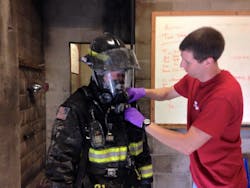Effects of Training Fires to be Studied at IFSI Next Week
Two dozen firefighters and ten fire instructors will join researchers at the Illinois Fire Service Institute (IFSI) beginning Saturday to continue studying the effects of fire, exposure and contamination on firefighters.
“This year’s study builds on last year’s efforts to better understand firefighters’ exposures to contaminants, heat stress and cardiovascular strain. One question that people are asking is what happens during training fires compared to typical fireground responses,” IFSI Research Program Director Dr. Gavin Horn said. “We’re systematically trying to address varying components of what firefighters encounter.”
Each scenario in the 2016 Cardiovascular and Chemical Exposure Project will focus on three different areas of research.
The team from UL’s Firefighter Safety Research Institute will be measuring thermal conditions in the structures, including testing a new helmet that can map temperatures and heat flux inside the burning building.
NIOSH team members will collect data—including PPE and skin wipes as well as blood, urine and breath samples—in their continued effort to understand the results of chemical exposure to firefighters.
The third area to be studied includes the impact of firefighter training on the firefighter’s cardiovascular system, led by the IFSI Research, Skidmore College and UIC team.
“We’re focusing on the fuels used in training fires.”
Each day a different fuel will be used in different burn buildings, including engineered wood, theatrical smoke and pallets with straw.
“Adding engineered wood products is expected to produce different smoke characteristics,” Horn said. “We’re looking to see what is in the air inside the buildings as well as what gets left on the gear and possibly the skin.”
Testing will include gross decontamination and using wipes to remove containments from the firefighter’s skin.
“There are some fire departments who will see more training fires than real fires, so we need to look at the effects from those,” says Horn.
The IFSI is located in Champaign and has been involved with firefighter research since the early 1990s when Dr. Denise Smith began researching the effects of heat stress on PPE.
Firehouse will have staff on site next week reporting on the training being conducted by IFSI, UL, NIOSH and UIC.
From Last Year's Research:
- Research Participants Join Efforts to Improve Firefighter Health
- Study Looks at Health Threats to Firefighters
Coverage of the 2016 Cardiovascular and Chemical Exposure Project brought to you by Globe.
